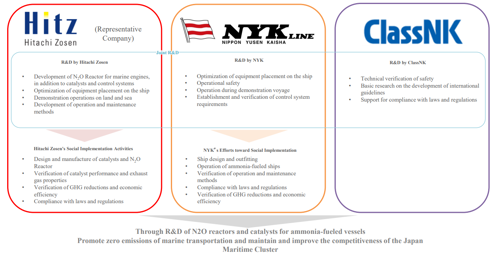N2O removal system for ammonia-fueled ships selected to receive developmental support from Japan’s Green Innovation Fund
Hitachi Zosen Corporation and Nippon Yusen Kabushiki Kaisha announced that their jointly proposed "Development of N2O Reactor for an Ammonia-Fueled Ship" has been selected by the Japan’s New Energy and Industrial Technology Development Organization as a “Next-Generation Ship Development”, which is additionally invited in November 2023 as part of Green Innovation Fund Projects.
In July 2023, the International Maritime Organization (IMO) set a target of reaching net-zero greenhouse gases (GHG) emitted from international marine transportation by or around 2050. To achieve this target, it is imperative to prioritize R&D towards the creation of next-generation ships that do not emit GHGs. In particular, the development of technology to convert marine fuel from conventional fossil fuels to alternative fuels such as ammonia, which emits no carbon dioxide (CO2) when combusted, is being promoted as GI Fund Projects.
The project jointly proposed by Hitachi Zosen and NYK aims to develop a catalytic removal system (hereinafter “N2O Reactor”) for nitrous oxide (N2O) emitted when ammonia is used as fuel. N2O's global warming potential* is about 300 times that of CO2. Therefore, reducing N2O emissions is essential in order to realize ammonia-fueled ships that are highly effective in reducing GHG emissions. By developing and disseminating an N2O Reactor, we are aiming for the early realization of a carbon-neutral in international maritime transport.
Hitachi Zosen has a strong track record and know-how in catalytic technology, including the development of a marine vessel selective catalytic reduction (SCR) system for removing nitrogen oxides (NOx) in marine engines. In this project, Hitachi Zosen develops catalysts and equipment to reduce N2O for marine 2-stroke engines** and optimizes equipment layout.
NYK plans to install the N2O Reactor developed by Hitachi Zosen on an ammonia-fueled ship scheduled to be delivered in November 2026. NYK conducts safety and performance verification on demonstration voyages. As a partner organization, ClassNK will conduct safety verification of N2O reactors and basic research on the development of international guidelines.
Roles of each party in this project and initiatives for social implementation

The three parties will lead the world in environmental technology by actively taking on the research and development of next-generation ships that do not emit GHGs, thus contributing to the reduction of GHGs emitted by international marine transportation.
Project outline
- Publicly solicited by Japan’s New Energy and Industrial Technology Development Organization (NEDO)
2. Project name: Next-Generation Ship Development Project (additional public offering), Green Innovation Fund Projects
3. Companies: Hitachi Zosen Corporation, Nippon Yusen Kabushiki Kaisha
4. Partner organization: ClassNK
5. R&D theme: Development of N2O Reactors for Ammonia-Fueled Carrier
6. Implementation period: Fiscal 2024 to 2027
* Global warming potential
A number that represents how well other GHGs are capable of warming the globe relative to CO2
** 2-stroke engine
An engine that burns once per rotation of the engine (one reciprocation of the piston) and is characterized by having a small number of parts and being compact and light-weight






Comments